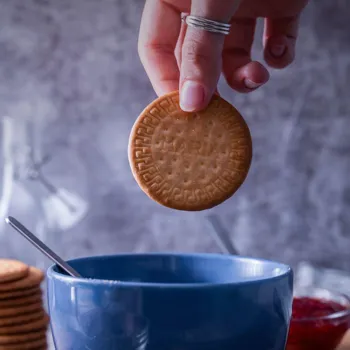Discover the truth about late-night eating habits: how it impacts weight, sleep, blood sugar, heartburn, gut health & mental well-being. Dive in to make informed choices for a healthier you
For many of
us in India, especially after a long day at work or endless family drama, a late-night snack feels like the perfect way to unwind. Maybe it's a bowl of poha, a simple upma, or even just a glass of milk. Comforting, right? But then the guilt creeps in.

Is this late-night habit actually bad for you? The answer, like most things in health, isn't a simple yes or no. Lets see.
Our bodies operate on a natural 24-hour cycle called the circadian rhythm. This rhythm influences various bodily functions, including digestion and metabolism.
Studies suggest that eating late at night can disrupt this rhythm, making it harder for your body to process food efficiently. When you eat close to bedtime, your body is gearing up for rest, not for digesting a heavy meal.
This can lead to undigested food lingering in your stomach, causing discomfort, bloating, and even heartburn. While the occasional late-night treat might not be a big deal, making it a regular habit could have long-term consequences.
Weight Gain: The Calorie Conundrum
One of the most common concerns about late-night eating is its potential to cause weight gain. But here's the thing: it's not necessarily the time of day you eat, but rather the total number of calories you consume throughout the day that matters most.
If you're consistently eating more calories than you burn, regardless of when you eat them, you're likely to gain weight.
However, late-night snacks often tend to be high in processed carbs or sugary treats, which are easily converted into fat and stored in the body, especially when you're less active before sleep.
Moreover, people who eat late at night may be more prone to making unhealthy food choices.
After a long day, willpower can wane, making it harder to resist cravings for sugary or fatty foods. These readily available, calorie-dense options provide instant gratification but contribute significantly to excess calorie intake.
Therefore, while the timing of your meal isn't the sole culprit, it can certainly exacerbate weight gain if it leads to overeating or poor food choices. The key to managing your weight is to eat a balanced diet with healthy portions throughout the day, regardless of when you eat your meals.
Sleep Disruption: Tossing and Turning
Eating too close to bedtime can interfere with your sleep quality. When you eat a large meal, your digestive system has to work hard to process the food. This can make it difficult to fall asleep and stay asleep.
Additionally, certain foods, like spicy food, can trigger heartburn and indigestion, further disrupting your sleep. Heartburn may be caused by increased stomach acid production.
Furthermore, lying down after eating can worsen heartburn symptoms, as it allows stomach acid to flow back up into the esophagus. The discomfort and pain associated with heartburn can make it difficult to fall asleep or stay asleep, leading to a restless night.
Consider the reason for eating late and keep to regular healthy meals to maintain better sleeping habits. Caffeine or sugary products can interfere with sleep.
These substances can stimulate the nervous system and disrupt your sleep cycle, leading to difficulty falling asleep or waking up frequently throughout the night which can lead to sleep disruption or sleeplessness.
Blood Sugar Spikes: A Diabetic Dilemma
For individuals with diabetes or insulin resistance, eating late at night can be particularly problematic. When you eat, your blood sugar levels rise. In healthy individuals, the body efficiently releases insulin to help transport glucose from the blood into cells for energy.

However, in people with diabetes or insulin resistance, this process is impaired, leading to elevated blood sugar levels. Eating late at night can exacerbate this issue, as the body's ability to regulate blood sugar may be diminished during sleep.
Consuming meals late, can result in high blood sugar levels in the morning. High blood sugar levels can contribute to long-term health complications such as heart disease, nerve damage, and kidney damage.
It's important for individuals with diabetes or insulin to monitor their blood sugar levels and follow a meal plan that helps to manage their blood sugar levels. If you have diabetes it is important to talk to your doctor.
Eating earlier and at regular times may help control glucose levels more effectively. It might be preferable to adjust meal timings to maintain steady levels.
Heartburn and Indigestion: A Burning Sensation
As previously mentioned, eating late at night can increase the risk of heartburn and indigestion. When you lie down after eating, it becomes easier for stomach acid to flow back up into the esophagus.

This can cause a burning sensation in your chest, as well as other symptoms like bloating, nausea, and belching. Certain foods, such as fried foods, spicy foods, and acidic foods, can worsen heartburn symptoms.
Drinking alcohol or caffeine can also relax the lower esophageal sphincter, which can make it easier for stomach acid to reflux back up into the esophagus.
To further explain, the lower esophageal sphincter (LES) is a muscular ring located at the junction of the esophagus and the stomach.
Its role is to prevent stomach acid from flowing back up into the esophagus. When you eat or drink, the LES relaxes to allow food and liquids to pass into the stomach. However, after the food and liquids have passed, the LES should tighten again to prevent acid reflux.
If the LES is weak or doesn't tighten properly, stomach acid can flow back up into the esophagus, causing heartburn symptoms.
Impact on Gut Health: The Microbiome Matters
Emerging research suggests that eating late at night can also affect the composition and function of your gut microbiome. The gut microbiome refers to the trillions of bacteria, fungi, viruses, and other microorganisms that live in your digestive tract.
These microbes play a crucial role in digestion, immunity, and overall health. Studies have shown that the gut microbiome goes through daily rhythms, with certain species becoming more active during the day and others at night.
Eating late at night can disrupt these rhythms, potentially leading to imbalances in the gut microbiome.
Specifically, eating at irregular hours can alter the diversity and abundance of different microbial species in the gut.
This disruption can affect various bodily functions, including metabolism, nutrient absorption, and immune function. A dysregulated gut microbiome has been linked to various health issues.
To maintain a healthy gut microbiome, it's important to eat a balanced diet rich in fiber and probiotic-rich foods, such as yogurt and fermented vegetables. Additionally, maintaining regular eating times can help support the natural rhythms of your gut microbiome and promote digestive health.
Mental Health Connection: The Mood-Food Link
There's growing awareness of the connection between food timing and mental health. Studies suggest that irregular eating patterns, including frequent late-night snacking, may be associated with an increased risk of mood disorders like anxiety and depression.

This connection is thought to be related to the disruption of circadian rhythms and their influence on brain function and neurotransmitter production. Neurotransmitters, such as serotonin and dopamine, play an important role in regulating mood, sleep, and appetite.
Moreover, emotional eating, which is the act of eating in response to emotions like stress, sadness, or boredom, often occurs during late-night hours. Engaging in emotional eating can lead to feelings of guilt and shame. These feelings can further contribute to mood disturbances.
Therefore, paying attention to your eating habits and addressing emotional triggers can play a vital role in supporting overall mental well-being. Maintaining regular, balanced meals throughout the day, and practicing mindful eating habits can help stabilize these chemical messengers.
The Verdict: Moderation is Key
So, is eating late at night bad for you? The answer depends on various factors, including your overall diet, lifestyle, and individual health conditions.
However, by considering these six key facts, you can make more informed choices about your late-night eating habits and promote better health and well-being. If you do indulge in a late-night snack, choose healthy options like fruits, nuts, or a small cup of yogurt.
Always listen to your body and adjust your eating habits to suit your individual needs.












